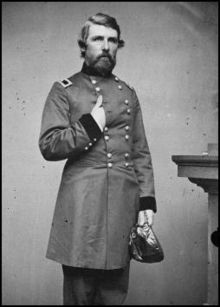Charles Smith Hamilton
| Charles Smith Hamilton | |
|---|---|

Charles Smith Hamilton
photo taken between 1861 and 1862 |
|
| Born |
November 16, 1822 Westernville, New York |
| Died | April 17, 1891 (aged 68) Milwaukee, Wisconsin |
| Place of burial | Forest Home Cemetery, Milwaukee, Wisconsin |
| Allegiance |
United States of America Union |
| Service/branch |
United States Army Union Army |
| Years of service | 1843–1853, 1861–1863 |
| Rank |
|
| Battles/wars | |
| Other work | U.S. marshal, manufacturer |
Mexican-American War
American Civil War
Charles Smith Hamilton (November 16, 1822 – April 17, 1891) was a career United States Army officer who fought with distinction during the Mexican-American War. He also served as a Union Army general during the early part of the American Civil War.
After the war Hamilton entered law enforcement and engaged in manufacturing.
Hamilton was born in Westernville, New York. He attended the United States Military Academy and graduated in 1843, standing 26th out of 39 cadets. He was appointed a brevet second lieutenant in the 2nd U.S. Infantry. Hamilton was promoted to second lieutenant on November 17, 1845, in the 5th U.S. Infantry, and promoted to first lieutenant on June 30, 1847.
During the Mexican-American War, he received a brevet promotion to captain for the battles of Contreras and Churubusco and was wounded in the Battle of Molino del Rey.
He resigned from the U.S. Army on April 30, 1853, moved to Fond du Lac, Wisconsin, and became a farmer and miller.
Hamilton chose to follow the Union cause and was appointed colonel of the 3rd Wisconsin Infantry on May 11, 1861, and was promoted to brigadier general on May 17. He was then given brigade command in Maj. Gen. Nathaniel P. Banks' division of the Army of the Potomac. At the outset of the Peninsula Campaign, Hamilton was given command of the 3rd Division, III Corps. He led this division during the Siege of Yorktown, but drew the ire of George B. McClellan for insubordination. Ignoring the fact that shelving Hamilton would create powerful political enemies, McClellan relieved Hamilton on April 30, 1862 without explanation. When Lincoln pointed out the impropriety of McClellan's action, McClellan claimed "You cannot do anything better calculated to injure my army ... than to restore Gen. Hamilton to his division." Before the month-long siege preparations were complete, Hamilton was transferred to the Western Theater where he commanded the 3rd Division in the Army of the Mississippi at the battles of Iuka and Corinth. Following Corinth in October 1862, he was promoted to major general, effective from September 19, 1862.
...
Wikipedia
